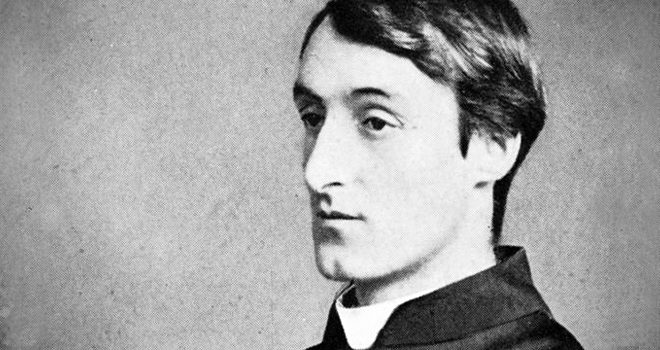Born: July 28, 1844, to Manley and Catherine. Father was in Marine Insurance business, and was quite well-to-do. He was a bit of a poet too. They were members of the Anglican Church. Hopkins was the first of nine children. He was educated at Balliol College, Oxford (1844). He wanted to be a painter like D.G. Rossetti. But something stronger was calling him in a different direction. He wanted to join the Roman Catholic Church. He was aware that he was meant for a higher calling.
John Henry Newman, who was at Oxford, and who had earlier converted to the Roman Catholic Church, was an inspiration for him. In 1867, Hopkins passed his Degree in classics with a first class, and within a year he joined the Roman Catholic Church, welcomed by Cardinal Newman. Before he decided to be a Jesuit priest, he burnt all his poems, because he felt writing poetry would be against the call of religion. But in 1872 , he happened to read Duns Scotus and about his concepts of instress and inscape. Hopkins felt writing poetry would not be antagonistic to his religious calling. He wanted to resume writing. He already had ideas of a new kind of poetry with sprung rhythm, and wanted to experiment. He resumed writing with “The Wreck of the Deutschland” . It was not destined to be published in his lifetime.( An anthology of his poems came out only after Hopkins’s lifetime.)
But, today The Wreck is regarded as his masterpiece. It is his longest poem too, and may be likened to Baudelaire’s Le Voyage, in length and in its masterly execution. Hopkins worked as a Jesuit priest, and also taught in several colleges. He died of typhoid on June 8, 1889 in Dublin.
The history of the poem’s recognition:
This poem was written in 1875-76, when the emigrant ship The Deutschland was drowned in which five Fransiscan nuns, among several others, died. The Month, a Jesuit journal, accepted it at first but subsequently rejected it. It remained in limbo for over half a century. In 1930 the literary world came to know of it because of an essay on it by F.R.Leavis. After another six years, W.H.Gardner worked on it , wrote on it , provided notes and explanations to Hopkins’s other poems too. And Hopkins , though still regarded as a forbidding poet, has been regarded as a significant poet. The Wreck established itself as an important contribution to English poetry.
The Deutschland:
The Deutschland was a German emigrant ship. It was carrying people out of Germany, when Catholics in hundreds had to leave the country under the oppressive Falk Laws of Prussia under Bismarck. The ship was to go to New York, and on the way was drowned in the Thames, in England (December 6, 1875) .Among several who died were five Fransiscan nuns.( ‘Rhine refused them: Thames would ruin them’: The Wreck) .And the poem is in the “happy memory” of the five nuns, who transformed their terrible tragedy into a kind of crucifixion.
About the poem:
This poem consists of two parts,35 verses ( Part One of ten verses, and Part Two of 25 ) of eight lines each (a total of 280 lines).Part one is about the poet’s inner conflict , and the second part describes the shipwreck. The Gita says ,”he who lacks in faith perishes” ( samsayaatmaa vinsyati 4.40).But in the process of the coming of faith,man almost perishes, “almost unmade” (The Wreck. L. 6). Hopkins once wrote to Bridges, that to the non-Catholic, a mystery is “an interesting uncertainty”, to the Catholic, “an incomprehensible certainty”. It is not easy to give up the effort to comprehend the mystery. It is usually observed that the first part of the poem does not mention the shipwreck . It might be said that in the first part , the storm is in man, and in the second part, man is in the storm.
Commentary:.
Part I
Thou mastering me
God! giver of breath and bread;
World’s strand, sway of the sea;
Lord of living and dead;
Thou hast bound bones & veins in me, fastened me flesh,
And after it almost unmade, what with dread,
Thy doing: and dost thou touch me afresh?
Over again I feel thy finger and find thee. 1
Literature, great literature, Catholic or Protestant, Christian or Judaic, is about justifying the ways of God to men, reconciling the God of Love with his cruel creation. Ivan in Dostoevsky’s The Karamazov Brothers says he has no problem with God; his problem is with his creation. The conviction that whatever happens in the world is God’s act of love, the terrible tragedies, the cruel calamities, the dreadful shipwrecks- it is not easy to accept these as acts of God’s Love. Did Hopkins write this poem in a state of acceptance and equanimity? Had he passed the initial shock on hearing about the shipwreck? The second verse of the poem begins, “ I did say yes”. What does it mean?
But let us begin at the beginning. “Thou mastering me / God! ”. The opening line is adjectival in its function. The poet is addressing God who is in the act of “mastering me”. An unusual adjectival, and an unusual sentence structure at the opening of the poem! “ Me” is Hopkins no doubt, but he is more than Hopkins.He is also Man. He is Nature too . Hopkins has given us, in his famous poem The Windhover, a description of Christ mastering Nature, the four elements. (The air is stated, “underneath him steady air” ; the other three are suggested.) Here in The Wreck too , the poem opens with the act of “mastering me”, Man. God is here literally a master, “maistri, the chief mason”. “Thou hast bound bones & veins in me, fastened me flesh”. A maistri uses brick, cement, and sand. The Master throws in some flesh, blood,and bones. And “fastens”. But the Master who builds, also demolishes , “almost unmade”. One can never know why He makes, and why He unmakes. He is the “giver of breath and bread”, life-giver and sustainer. “World’s strand, sway of the sea” : “strand” can mean thread. God is like a thread which keeps the beads together . The Gita says, “like a thread that runs through the diamonds” ( sootre maniganaa iva 7.7.) Strand can also mean the border. God is the limit, the unsurpassable. What he has made he doesn’t unmake totally, but he “almost unmade”. What is “ almost”?
Man thinks an act of demolition is going on. But it is only being redesigned, for a higher purpose. While the maistri is at unmaking, man is unaware of the real redesigning, and is deluded that he is “unmade”, but man is also uncertainly aware that he is only “almost” unmade. The Maistri is redoing, “Thy doing”. The process of redoing is almost demolition, death on one plane. And before sending him out, he also gives the final touches, “Thy doing: and dost thou touch me afresh? /Over again I feel thy finger and find thee.” Strangely, man feels the finger of the Maistri, not at the time of making, but in the act of unmaking.This finger appears in the poem again in verse 31: “Finger of a tender of, O of a feathery delicacy.” The unmaking finger, of the Maistri is delicate like a feather. To change the metaphor, the surgeon’s knife is “ tender”, and “of a feathery delicacy.” He had felt the finger earlier too, but “ over again I feel thy finger and find thee.” The second coming of the finger, “ over again”, reveals the touch of the Master. The “mastering me” is an eternal act of fierce fight as well fine delicate spiritual surgery.
The subject of the opening verse of the poem is “mastering me “, and as has been noted , “me” is Man and Nature too. The mastering of Nature, the elements, is literally mentioned later in the poem with a reference to the story in the Bible ( Matthews) of the miracle wrought by Christ in the Sea of Galilee.









Add comment